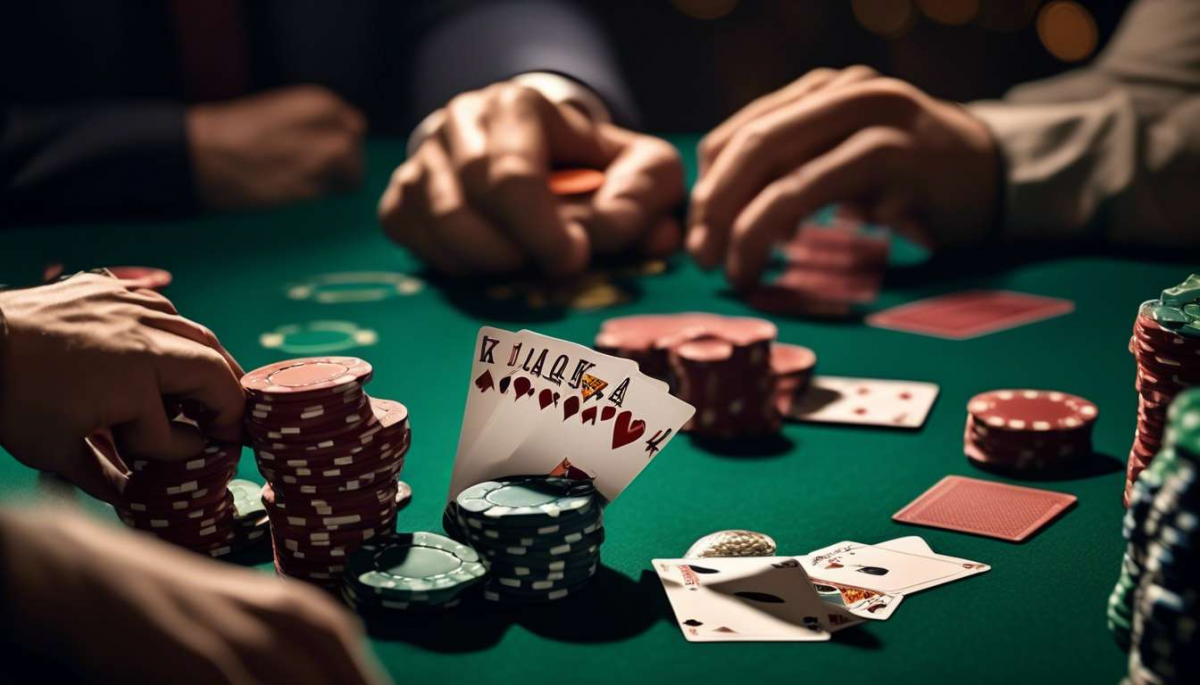In the thrilling world of poker, we find ourselves constantly drawn to the allure of the game, where strategy meets chance and every hand is an opportunity to master. Together, we embark on a journey to uncover the intricacies of poker, seeking not just to play, but to excel.
Through countless hours at the table, we’ve learned that success in poker demands more than just luck; it requires a blend of:
- Skill
- Patience
- Psychological insight
Each game presents a unique set of challenges and, with it, the potential for great reward.
As we delve deeper into the art of poker, we aim to share the essential tips and strategies that have proven effective in honing our abilities. From understanding the importance of position to mastering the subtle art of bluffing, we are committed to guiding you through the nuances of the game.
Our goal is to ensure that our collective journey leads us to poker success.
Understanding Positional Play
In poker, our position at the table significantly influences our strategic decisions and overall success. Being part of a community that appreciates the nuances of the game, we understand that the power of position can’t be overstated.
Late Position:
- When we’re in a late position, we act last, giving us a clearer view of our opponents’ moves.
- This advantage helps us make informed decisions.
- We gain the ability to control the pot size and apply pressure on others, which is crucial for poker success.
Early Position:
- Conversely, when we’re in early position, we must play more cautiously.
- We have less information about others’ intentions.
- It’s important to rely on strong hands and avoid unnecessary risks.
Middle Position:
- Middle position offers a balance.
- We can adapt our strategy based on earlier actions.
Embracing these tips, poker becomes not just a game of chance but a strategic battle. By understanding positional play, we enhance our sense of belonging within the poker community, sharing victories and learning from defeats together.
Developing Solid Starting Hand Strategy
A solid starting hand strategy is crucial because it lays the foundation for making effective decisions throughout the game. As a community of poker enthusiasts, we understand that selecting the right starting hands can be the difference between a successful session and a frustrating one. By focusing on a strategic approach, we’re ensuring we’re playing alongside fellow players who respect the game as much as we do.
To develop this strategy, let’s first categorize our hands:
-
Premium Hands:
- Pocket aces
- Pocket kings
-
Strong Contextual Hands:
- Suited connectors
Our shared goal is to play smart, not just aggressively. Folding weaker hands, especially in early positions, gives us a stronger presence at the table.
When we exchange tips, poker players often emphasize the importance of adaptability. By analyzing opponents’ moves and adjusting our starting hand strategy accordingly, we become formidable players.
Together, we improve, learn, and succeed.

Utilizing Pot Odds Calculation
Calculating pot odds is an essential skill that helps us make informed decisions about whether to call, raise, or fold during a game. By understanding pot odds, we can feel more connected to the game’s rhythm and make strategic moves that align with our poker community. It’s like a secret handshake among poker players—knowing when the math is in our favor brings us closer to success.
Pot odds involve comparing the size of the current pot to the size of the bet we must call. This ratio helps us determine if the potential reward justifies the risk.
One of our favorite poker tips is to practice this calculation until it becomes second nature. Doing so not only enhances our gameplay but also helps us feel more confident and aligned with seasoned players at the table.
Let’s embrace this tip together by:
- Refining our skills
- Deepening our connection to the poker world
By mastering pot odds, we edge closer to poker success.

Mastering the Art of Bluffing
Bluffing is an indispensable strategy that requires skillful deception to capitalize on opponents’ uncertainty. In poker, mastering this art can distinguish us from the crowd.
Understanding Opponents:
To effectively bluff, it’s crucial to:
- Understand opponents’ tendencies.
- Observe their betting patterns.
- Pay attention to body language for valuable clues.
Timing is Everything:
A well-timed bluff can shift the game’s momentum in our favor. Consider these points:
- Choose the right moment, such as when opponents show hesitation.
- Maintain a consistent table image to make opponents believe in our strong hands, even when we might not have them.
Building Confidence and Community:
Incorporating these poker tips into our strategy not only builds our confidence but also fosters camaraderie with fellow players. By bluffing effectively and embracing shared experiences, we strengthen our connection to the poker community, ensuring our place in this thrilling game.

Managing Your Bankroll Effectively
Managing our bankroll effectively is crucial to ensuring long-term success and sustainability in poker. By keeping our finances in check, we not only safeguard our investments but also enhance our overall poker experience.
Practical Tips for Bankroll Management:
-
Set a Dedicated Poker Bankroll:
- Keep your poker funds separate from everyday finances.
- This separation helps maintain discipline and prevents dipping into essential finances.
-
Establish Clear Limits for Each Session:
- Ensure you never risk more than you can afford to lose.
- This practice keeps you in the game longer, allowing you to ride the highs and lows without panic.
-
Track Wins and Losses:
- Gain insights into your performance.
- Adjust your strategies accordingly based on this data.
-
Exercise Patience:
- Resist the temptation to chase losses.
- Focus on making calculated, informed decisions.
Together, these strategies foster a supportive poker community and pave the way for collective success. By applying these principles, we can enhance our poker experience and ensure financial sustainability.

Reading Your Opponents’ Tells
Understanding our opponents’ tells can significantly elevate our gameplay and decision-making at the poker table. We all crave that sense of community and connection, and part of that is knowing we can read the room and anticipate moves.
Physical Cues:
- Pay close attention to shifts in posture.
- Observe changes in breathing.
- Notice how opponents handle their chips.
These small signs often reveal the strength or weakness of their hand.
Verbal Tells:
- Listen for changes in voice tone.
- Be aware of the speed of speech.
Sometimes, a player might try to throw us off with talk, but inconsistency can give away their bluff.
Consistent Observation:
- Consistently observe patterns and reactions.
- Hone your skills to identify these tells.
- Strengthen your bond with fellow players.
- Enhance your strategic edge.
By focusing on these aspects, we bring ourselves closer to success.

Enhancing Your Psychological Resilience
Building Psychological Resilience in Poker
Building our psychological resilience is crucial for maintaining focus and composure during the highs and lows of poker. We know that every hand can bring unexpected outcomes, but it’s our mental strength that keeps us steady.
Acknowledge Emotions
To enhance this resilience, we must first acknowledge our emotions without letting them dictate our actions. Recognizing when frustration or overconfidence creeps in helps us stay grounded.
Practice Mindfulness
Let’s also practice mindfulness. By cultivating a mindful presence at the table, we can:
- Reduce stress
- Make more rational decisions
Breathing exercises or quick mental resets between hands can be incredibly beneficial.
Embrace the Community
Another tip is to embrace the community. Sharing experiences and learning from fellow players:
- Builds our skills
- Reinforces our sense of belonging
We’re part of a shared journey, and supporting each other can enhance our psychological fortitude.
View Setbacks as Learning Opportunities
Finally, let’s remind ourselves that setbacks are part of the game. Viewing losses as learning opportunities strengthens our resolve and prepares us for future challenges.

Practicing Consistent Self-Improvement
To excel in poker, we must commit to consistent self-improvement by analyzing our play and seeking new strategies. This journey isn’t one we embark on alone; it’s a shared quest with fellow enthusiasts who understand the game’s complexities.
Together, we can:
- Exchange tips
- Dissect hands
- Discuss poker strategies that elevate all of us
Let’s start by reviewing our past games. We should look for patterns in our play, identifying both strengths to build on and weaknesses to address. By doing so, we’ll gain insights into areas needing improvement.
Another vital step is staying updated on new poker trends and tactics.
- Joining poker forums
- Attending workshops
These activities can help us remain at the cutting edge.
Additionally, setting specific goals is crucial. Whether it’s:
- Mastering a particular hand
- Increasing our win rate
Clear objectives keep us focused.
Remember, every poker legend started where we are now, relentlessly pursuing betterment in an inclusive community. Let’s grow together!
How can I manage my emotions after a bad beat?
Managing Emotions After a Bad Beat
When we face a bad beat, it’s crucial to manage our emotions in order to stay focused. Here are some strategies to help regain composure:
-
Taking Deep Breaths: This helps to calm the mind and reduce immediate stress.
-
Reminding Ourselves of Variance: Accept that variance is part of the game, which can help us maintain perspective.
-
Stepping Away for a Moment: Taking a short break can provide the necessary space to cool down and reset.
Boosting Confidence
Reflecting on past successes can remind us of our capabilities and boost confidence. Additionally, strategizing for the future can provide a sense of control and direction.
Growth and Improvement
By staying level-headed and learning from setbacks, we can:
- Grow stronger.
- Improve our game in the long run.
These practices not only help in handling immediate challenges but also contribute to our overall development as players.
What are some effective ways to improve my concentration during long poker sessions?
To improve our concentration during long poker sessions, we find that several strategies are effective:
1. Take Short Breaks
- Regular short breaks help refresh your mind.
2. Stay Hydrated
- Drinking water keeps your brain functioning optimally.
3. Focus on the Present Moment
- Avoid distractions and concentrate on the current hand.
Incorporate Mindfulness Techniques
- Practice mindfulness to enhance your awareness and attention.
Set Small Goals for Each Session
- Achieving these goals keeps you motivated and focused.
Consistency is Key
- Regularly implementing these habits will lead to improved concentration and overall performance during poker games.
By integrating these strategies, you can maintain mental sharpness and make better decisions at the table.
How do professional players prepare mentally before a major tournament?
Before a major tournament, professional players focus on mental preparation. There are several key strategies we employ to ensure we are mentally ready:
- We engage in visualization exercises to envision success and build confidence.
- Mindfulness techniques are practiced to help us stay present and calm.
Setting clear goals and developing a game plan are crucial components of our preparation.
In addition to mental strategies, we prioritize:
- Rest
- Healthy eating
- Physical exercise
These ensure our peak performance.
Overall, our mental readiness is key to facing the challenges of high-stakes tournaments with confidence and composure.
Conclusion
In conclusion, remember to stay focused on mastering these essential poker skills:
-
Position Play: Understanding the importance of your position at the table and how it affects your strategy.
-
Starting Hand Strategy: Knowing which hands to play and which to fold based on your position and the action before you.
-
Pot Odds Calculation: Being able to calculate pot odds to make informed decisions about calls and raises.
-
Bluffing: Developing the ability to bluff effectively and recognize when others are bluffing.
-
Bankroll Management: Managing your funds wisely to ensure longevity in the game.
-
Reading Tells: Observing and interpreting opponents’ behaviors and betting patterns to gain an advantage.
-
Psychological Resilience: Maintaining composure and focus in the face of adversity and bad beats.
-
Continual Self-Improvement: Constantly learning and adapting your strategies to improve your game over time.
By honing these abilities and staying disciplined in your approach, you’ll be well on your way to achieving success at the poker table.
Keep practicing, learning, and adapting to different situations to become a true master of the game.
Good luck!